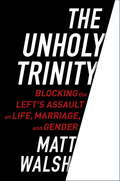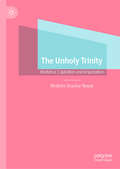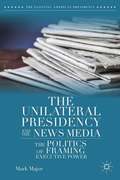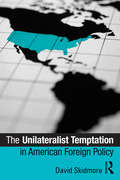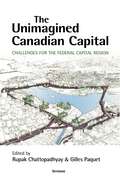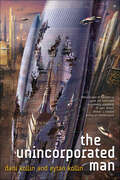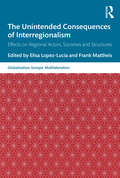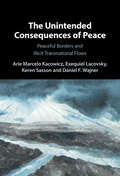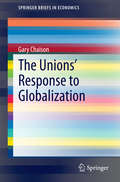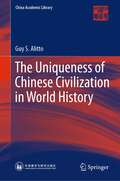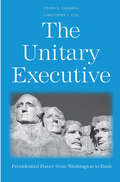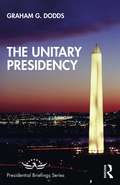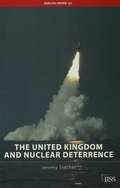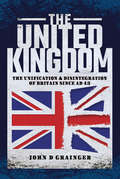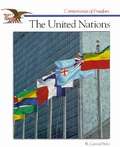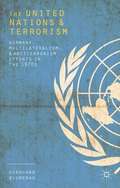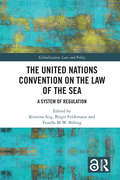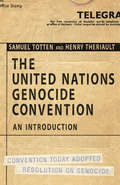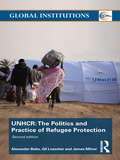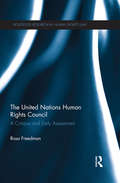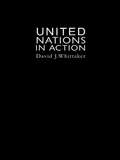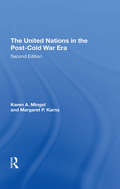- Table View
- List View
The Unholy Trinity: Blocking the Left's Assault on Life, Marriage, and Gender
by Matt WalshIT’S NOW OR NEVER FOR CONSERVATIVE VALUESThis highly anticipated debut from Matt Walsh of The Blaze demands that conservative voters make a last stand and fight for the moral center of America. The Trump presidency and Republican Congress provides an urgent opportunity to stop the Left's value-bending march to destroy the culture of our country. Republican control of the presidency, senate, and House of Representatives for the next two years is a precious—and fleeting—gift to conservatives. Americans concerned with blocking liberals’ swift rethinking of life, marriage, and gender need to capture this moment to turn the tide of history. For years conservatives have worried endlessly about peripheral issues, liberals have been hard at work chipping away at the bedrock of our civilization, and putting a new foundation in its place. New attitudes on abortion, gay marriage, and gender identity threaten to become culture defining victories for progressives—radically altering not just our politics, but dangerously placing Man above God and the self above the good of the whole. What’s at stake? The most fundamental elements of society, including how we understand reality itself. In The Unholy Trinity, TheBlaze contributor Matt Walsh draws on Catholic teachings to expose how liberals have attempted, with startling success, to redefine life, marriage, and gender. Abortion redefines human life, gay marriage redefines the family, and the latest theories on gender redefine what it means to be a man or a woman. The potential consequences are dire. If progressivism can bend life, family, and sex to its whims, Walsh argues, it has established relativism over God as the supreme law, and owns the power to destroy western civilization. With insight, candor, and faith, Walsh shows conservatives how to confront liberal arguments, defeat the progressive agenda for good, and reclaim American culture for truth.
The Unholy Trinity: Hindutva, Capitalism and Imperialism
by Bhabani Shankar NayakThis book offers critical commentary and passionate analysis on the implications of Hindutva, capitalism, and imperialism for the everyday lives of working people and the planet. The emergence of the alliance between Hindutva politics and corporate capitalism during the latter half of the twentieth century significantly shaped society, state and governments aligning it with the demands of global capitalism and its imperialist hegemony. The collaboration and contestation between Hindutva, capitalism, imperialism, and other reactionary forces shape the nature of the state, government, culture, politics and society in India and beyond. The book provides an auto ethnographic and alternative analysis based on reflections on the realities of everyday lives and experiences of the past and present of this unholy trinity and its global implications.
The Unilateral Presidency and the News Media
by Mark MajorMedia coverage of presidential actions can not only serve journalistic purposes, but can also act as a check against unilateral decision making. The book seeks to uncover how the news media has worked to curtail overreaching power within the executive branch, demonstrating how the fourth estate keeps presidential overreach at bay.
The Unilateralist Temptation in American Foreign Policy (Foreign Policy Analysis)
by David SkidmoreThe pattern of multilateral engagement and unilateral retrenchment in American foreign policy from the Cold War through the Clinton, Bush, and Obama years presents a puzzle. What accounts for the unilateralist turn? Is it a passing aberration attributable to the neoconservative ideology of the Bush administration? What then of the disengagement evident earlier during Clinton’s presidency, or its continuation under Obama? Was the U.S. investment in multilateral institutions following World War II an anomaly? Or is the more recent retreat from international institutions the irregularity? Skidmore traces U.S. unilateralism to the structural effects of the end of the Cold War, both domestically and abroad, to argue that the United States was more hegemonic than multilateralist—a rule-maker, not a rule-taker. An "institutional bargain" existed under the Cold War threat from the Soviets, but absent those imperatives the United States has been less willing to provide collective goods through strong international institutions and other states are less willing to defer to U.S. exemptions. On the home front, the post-Cold War political environment has made it more difficult for presidents to resist the appeals of powerful interests who are threatened by multilateral commitments. This book demonstrates that American unilateralism has deeper roots and more resilience than many expect. The unilateral temptation can only be overcome through new political bargains domestically and internationally that permit multilateral engagement, even the absence of great power rivalry.
The Unimagined Canadian Capital: Challenges for the Federal Capital Region
by Caroline Andrew Anne Gilbert Andrew Sancton André Juneau David L. Gordon Éric Champagne Guy Chiasson Meyer Burstein Almos TassonyiToo many stakeholders have neglected their duty of imagining an aspiring federal capital region for Canada. Under the auspices of the Forum of Federations, a number of persons interested in the fate of Canada’s federal capital region came together to examine the challenges facing the region and to put forward suggestions to deal with them.In this report on the brainstorming exercise conducted in January 2011, professionals, academics, and elected officials take stock of the vast array of assets on which the federal capital region can build; probe the many sources of failures in coping as effectively and creatively as one would expect with the diversity, trans-border, financial, and governance challenges; and make suggestions to ensure that the federal capital region does not remain “unimagined” in the future.
The Unincorporated Man (The\unincorporated Man Ser. #2)
by Dani Kollin Eytan KollinPrometheus Award Winner for Best Novel: “Fans of SF as a vehicle for ideas will devour this intriguing debut.” —Publishers WeeklyIn the wake of complete economic collapse, a reborn civilization has arisen. It is one in which every individual is incorporated at birth, and spends many years trying to attain control over his or her own life by getting a majority of his or her own shares. Life extension has made life very long indeed.Now the incredible has happened: A billionaire businessman named Justin Cord, frozen in secret in the long-ago early twenty-first century, has been discovered and resurrected, given health and a vigorous younger body. Justin is the only unincorporated man in the world, a true stranger in this strange land. He survived because he’s tough and smart. And he cannot accept only part ownership of himself, even if that places him in conflict with a civilization that extends outside the solar system to the Oort Cloud . . .“The clash between today’s cultural values and those of a vividly imagined future has never been more compelling . . . The Kollin brothers’ debut captivates with unforgettable characters and an ingenious vision of the economic future.” —Booklist“A bright, stimulating work that deserves a wide readership.” —Gregory Benford, New York Times–bestselling author of Foundation’s Fear“Reminiscent of Heinlein—a good, old-fashioned, enormously appealing SF yarn.” —Robert J. Sawyer, Nebula Award–winning author of The Downloaded
The Unintended Consequences of Interregionalism: Effects on Regional Actors, Societies and Structures (Globalisation, Europe, and Multilateralism)
by Frank Mattheis Elisa Lopez-LuciaThis edited book brings a new analytical angle to the study of comparative regionalism by focussing on the unintended consequences of interregional relations. The book satisfies the need to go beyond the consideration of the success or failure of international policies. It sheds light on complex interactions involving multiple actors, individual and institutional, driven by various representations, interests and strategies, and which often result in unintended consequences that powerfully affect the socio-political context in which they unfold. By providing a new conceptual framework to understand how interregionalism brings about social change, the book examines the effects on the individual and institutional actors of interregional relations, and the effects on the social structures that constitute interregionalism. It also examines interregionalism’s transformational character for structures of regional and international governance, as well as societies. This book will be of key interest to scholars and students in the fields of comparative regionalism, interregionalism, EU studies, international and regional organisations, global governance and more broadly to international relations, international politics and (comparative) area studies.
The Unintended Consequences of Peace: Peaceful Borders and Illicit Transnational Flows
by Exequiel Lacovsky Arie Marcelo Kacowicz Keren Sasson Daniel F. WajnerScholars of international relations generally consider that under conditions of violent conflict and war, smuggling and trans-border crime are likely to thrive. In contrast, this book argues that in fact it is globalisation and peaceful borders that have enabled transnational illicit flows conducted by violent non-state actors, including transnational criminal organizations, drug trafficking organizations, and terrorist cells, who exploit the looseness and demilitarization of borderlands. Empirically, the book draws on case studies from the Americas, compared with other regions of the world experiencing similar phenomena, including the European Union and Southeast Europe (the Western Balkans), Southern Africa, and Southeast Asia. To explain the phenomenon in itself, the authors examine the type of peaceful borders and regimes involved in each case; how strong each country is in the governance of their borderlands; their political willingness to control their peaceful borders; and the prevailing socio-economic conditions across the borderlands.
The Union War (The\north's Civil War Ser.)
by Gary W. GallagherEven one hundred and fifty years later, we are haunted by the Civil War—by its division, its bloodshed, and perhaps, above all, by its origins. Today, many believe that the war was fought over slavery. This answer satisfies our contemporary sense of justice, but as Gary Gallagher shows in this brilliant revisionist history, it is an anachronistic judgment. In a searing analysis of the Civil War North as revealed in contemporary letters, diaries, and documents, Gallagher demonstrates that what motivated the North to go to war and persist in an increasingly bloody effort was primarily preservation of the Union. Devotion to the Union bonded nineteenth-century Americans in the North and West against a slaveholding aristocracy in the South and a Europe that seemed destined for oligarchy. Northerners believed they were fighting to save the republic, and with it the world’s best hope for democracy. Once we understand the centrality of union, we can in turn appreciate the force that made northern victory possible: the citizen-soldier. Gallagher reveals how the massive volunteer army of the North fought to confirm American exceptionalism by salvaging the Union. Contemporary concerns have distorted the reality of nineteenth-century Americans, who embraced emancipation primarily to punish secessionists and remove slavery as a future threat to union—goals that emerged in the process of war. As Gallagher recovers why and how the Civil War was fought, we gain a more honest understanding of why and how it was won.
The Unions' Response to Globalization
by Gary ChaisonGlobalization is commonly described in trade and cultural terms but its impact on unions and collective bargaining is seldom assessed. The few studies of unions and globalization are mostly collections of cases studies of how unions can work together or with other alliance partners to defend against the power of multinational corporations. This book goes beyond the current research by asking how unions have tried to deal with globalization and how globalization might threaten the fundamental union mission of taking wages, hours and conditions of employment out of competition. The introductory chapter defines globalization and uses the case of the Detroit Three automakers (GM, Chrysler and Ford) to show how globalization can affect employment and union size, influence and relevancy. The second chapter shows how unions deal globalization through collective bargaining regarding outsourcing, alliances, strikes and political action, including lobbying and international work standards. The final chapter argues that the unions cannot continue unchanged in this age of globalization and asks what they must do to be effective and relevant.
The Uniqueness of Chinese Civilization in World History (China Academic Library)
by Guy S. AlittoThe book is a meticulous work in answering these questions which often occur to foreigners as well as modern Chinese themselves at the thought of the old China and its experience in modern times: What is Chinese civilization? How could it exist for several millennia and spread that far? Is there anything inherent in this civilization?From the standpoint of an “outsider” to this civilization, the author incorporates various elements, such as geographic factors, language, thoughts, with the recurrent themes along the two thousand years and changes throughout, rather than simply following a lineal progression. His historiographical approach, the methodology of eclectic common sense, as he termed it, is a new try in this field and will present a brand new perspective for both readers and researchers in that field.
The Unitary Executive
by Steven G. Calabresi Christopher S. YooThis book is the first to undertake a detailed historical and legal examination of presidential power and the theory of the unitary executive. This theory--that the Constitution gives the president the power to remove and control all policy-making subordinates in the executive branch--has been the subject of heated debate since the Reagan years. To determine whether the Constitution creates a strongly unitary executive, Steven G. Calabresi and Christopher S. Yoo look at the actual practice of all forty-three presidential administrations, from George Washington to George W. Bush. They argue that all presidents have been committed proponents of the theory of the unitary executive, and they explore the meaning and implications of this finding.
The Unitary Presidency (Presidential Briefings Series)
by Graham G. DoddsThe theory of the unitary executive is one of the most controversial and significant constitutional doctrines of the past several decades. It holds that the U.S. president alone embodies all executive power and therefore has unlimited ability to direct the many people and institutions within the federal government’s vast executive branch. It thus justifies the president’s prerogative to organize the executive branch and to direct its activities, to tell executive personnel what to do and to fire them if desired, to control the flow of information, and to issue signing statements that make judgments about constitutionality and determine the extent to which laws will be implemented. In some versions, it also endorses implied or inherent powers and permits the president to completely control foreign policy and military action. Proponents say this conception of the presidential office is faithful to the Constitution, facilitates the sort of energetic executive that Alexander Hamilton argued for, and enhances administrative efficacy and political accountability for governance. Critics say this arrangement is constitutionally inaccurate, is belied by historical practice and legal precedents, and is dangerously close to the monarchical power that provoked the American Revolution – and can be especially threatening in the era of Donald Trump. This book examines how controversies about unitary executive power have played out from the founding era to the present day with a focus on recent presidents, it explores arguments both for and against the unitary executive theory, and it looks ahead to future implications for American politics.
The United Arab Emirates: Power, Politics and Policy-Making (The Contemporary Middle East)
by Kristian Coates UlrichsenLed by Dubai and Abu Dhabi, the UAE has become deeply embedded in the contemporary system of international power, politics, and policy-making. Only an independent state since 1971, the seven emirates that constitute the UAE represent not only the most successful Arab federal experiment but also the most durable. However, the 2008 financial crisis and its aftermath underscored the continuing imbalance between Abu Dhabi and Dubai and the five northern emirates. Meanwhile, the post-2011 security crackdown revealed the acute sensitivity of officials in Abu Dhabi to social inequalities and economic disparities across the federation. The United Arab Emirates: Power, Politics, and Policymaking charts the various processes of state formation and political and economic development that have enabled the UAE to emerge as a significant regional power and major player in the post Arab Spring reordering of Middle East and North African Politics, as well as the closest partner of the US in military and security affairs in the region. It also explores the seamier underside of that growth in terms of the condition of migrant workers, recent interventions in Libya and Yemen, and, latterly, one of the highest rates of political prisoners per capita in the world. The book concludes with a discussion of the likely policy challenges that the UAE will face in coming years, especially as it moves towards its fiftieth anniversary in 2021. Providing a comprehensive and accessible assessment of the UAE, this book will be a vital resource for students and scholars of International Relations and Middle East Studies, as well as non-specialists with an interest in the United Arab Emirates and its global position.
The United Kingdom and Nuclear Deterrence (Adelphi Paper #386)
by Jeremy StockerIn December 2003 the British government announced that within a few years it would need to take decisions about the future of Britain's strategic nuclear deterrent. Exactly three years later, its plans were revealed in a White Paper. The existing Trident system is to be given a life-extension, which includes building new submarines to carry the missiles, costing £15–20 billion. Britain has a substantial nuclear legacy, having owned nuclear weapons for over half a century. The strategic context for the deterrent has changed completely with the end of the Cold War, but nuclear weapons retain much of their salience. This Adelphi Paper argues that it makes sense to remain a nuclear power in an uncertain and nuclear-armed world. Given that deterrence needs are now less acute, but more complex than in the past, the paper asserts that deterrence also needs to be aligned with non-proliferation policies, which seek to reduce the scale of threats that need to be deterred. Somewhat overlooked in current policy are appropriate measures of defence, which can raise the nuclear threshold and, if required, mitigate the effects of deterrence failure. It concludes that the government's decisions about the future form of the deterrent are very sensible, but cautions that they still need to be integrated into a broader policy that embraces diplomacy, deterrence and defence to counter the risks posed by nuclear proliferation.
The United Kingdom: The Unification & Disintegration of Britain Since AD 43
by John D. Grainger&“A salient, measured, and illuminating study of history with reflections on what Britain&’s past means for its present and future, highly recommended.&” —Midwest Book Review John Grainger examines the long and erratic process by which the British Isles was gradually (and as it turns out, temporarily) unified over the course of eighteen centuries, and the subsequent beginnings of the process of disintegration, manifested in an independent Ireland and increasing devolution to, and nationalism in, Scotland and Wales. Taking the Roman (partial) conquest and forming of the province of Britannia as his starting point, he outlines the major stages by which unification was brought about, through invasions (or in reaction to the threat thereof) and the vagaries of dynastic succession. James I was the first monarch to reign simultaneously over the whole British Isles but full political union was not completed until the Act of Union that came into effect on 1 January 1801, against the backdrop of war with France. It was maintained for just 122 years before the Republic of Ireland gained independence in 1922. John Grainger sees the granting of their own parliaments to Wales and Scotland as further stages in the process of disintegration, which may be accelerated by &“Brexit.&” &“The story of the United Kingdom is a mixture of myth, mystery and fact. This book provides a fact-based appraisal—Very Highly Recommended.&” —Firetrench &“This excellent treatise on how the United Kingdom became the UK following years of Dark Ages invasions and through the middle ages unification with Scotland makes for a very interesting read.&” —Books Monthly
The United Nations (Cornerstones of Freedom)
by R. Conrad SteinChildren's history of the United Nations, which is is New York City.
The United Nations And Terrorism
by Bernhard BlumenauThis is a study that examines United Nations' efforts against terrorism in the 1970s and how West Germany came to influence and lead them. It is also an account of several hostage and hijacking crises as well as a look at German domestic terrorism.
The United Nations Convention on the Law of the Sea: A System of Regulation (Globalization: Law and Policy)
by Kristina Siig Birgit Feldtmann Fenella M.W. BillingThe 1982 United Nations Convention on the Law of the Sea (UNCLOS) has for four decades been considered by many to be one of the most important legislative achievements of international law. It is revered as a "constitution of the oceans", providing the legal framework for the governance of the oceans. This volume explores how the UNCLOS is functioning in various complex settings, how it adapts to new, emerging developments, as well as how it interacts with other regulation, both within the law of the sea regime and outside. Engaging in themes such as law and order at sea, UNCLOS’ interaction with human rights and the role of private actors, the book raises complex questions in the application, understanding, and enforcement of the convention and how it can be envisaged, interpreted, and used in a dynamic world. The volume also raises methodological questions, the answers to which may enhance the predictability and coherence of the law under UNCLOS and thus secure its role as the predominant and relevant system for legal governance at sea for many decades to come. As a contribution to ensuring the future relevance of UNCLOS, the book will be a valuable resource for scholars, diplomats, judges and other practitioners who are working with and interpreting the law of the sea and related issues of maritime law, migration law, human rights law and humanitarian law.
The United Nations Convention on the Law of the Sea: A System of Regulation (Globalization: Law and Policy)
by Kristina Siig Birgit Feldtmann Fenella M.W. BillingThe 1982 United Nations Convention on the Law of the Sea (UNCLOS) has for four decades been considered by many to be one of the most important legislative achievements of international law. It is revered as a "constitution of the oceans", providing the legal framework for the governance of the oceans. This volume explores how the UNCLOS is functioning in various complex settings, how it adapts to new, emerging developments, as well as how it interacts with other regulation, both within the law of the sea regime and outside. Engaging in themes such as law and order at sea, UNCLOS’ interaction with human rights and the role of private actors, the book raises complex questions in the application, understanding, and enforcement of the convention and how it can be envisaged, interpreted, and used in a dynamic world. The volume also raises methodological questions, the answers to which may enhance the predictability and coherence of the law under UNCLOS and thus secure its role as the predominant and relevant system for legal governance at sea for many decades to come.As a contribution to ensuring the future relevance of UNCLOS, the book will be a valuable resource for scholars, diplomats, judges and other practitioners who are working with and interpreting the law of the sea and related issues of maritime law, migration law, human rights law and humanitarian law.
The United Nations Genocide Convention: An Introduction (G - Reference, Information And Interdisciplinary Subjects Ser.)
by Samuel Totten Henry C. TheriaultIt is virtually impossible to understand the phenomenon of genocide without a clear understanding of the complexities of the United Nations Convention on the Prevention and Punishment of the Crime of Genocide (UNCG). This brief but cogent book provides an introduction to the unique wording, legal terminology, and key components of the convention, which was adopted by the United Nations General Assembly in 1948. Providing clarity on the distinctions between genocide, crimes against humanity, war crimes, and ethnic cleansing, this book is designed to be an entry into further study of genocide in its legal, historical, political, and philosophical dimensions. Key terms, such as intent and motive, are explained, case studies are included, and a detailed bibliography at the conclusion of the book offers suggested avenues for more advanced study of the UNCG.
The United Nations High Commissioner for Refugees: The Politics and Practice of Refugee Protection (Global Institutions)
by Alexander Betts Gil Loescher James MilnerThis revised and expanded second edition of The United Nations High Commissioner for Refugees (UNHCR) continues to offer a concise and comprehensive introduction to both the world of refugees and the organizations that protect and assist them. This updated edition also includes: up to date coverage of the UNHCR’s most recent history and policy developments evaluation of new thinking on issues such as working in UN integrated operations and within the UN peacebuilding commission assessment of the UNHCR’s record of working for IDP’s (internally displaced persons) discussion of the politics of protection and its implications for the work of the UNHCR outline of the new challenges for the agency including environmental refugees, victims of natural disasters and survival migrants. Written by experts in the field, this is one of the very few books to trace the relationship between state interests, global politics, and the work of the UNHCR. This book will appeal to students, scholars, practitioners, and readers with an interest in international relations.
The United Nations Human Rights Council: A critique and early assessment (Routledge Research in Human Rights Law)
by Rosa FreedmanThe United Nations Human Rights Council was created in 2006 to replace the UN Commission on Human Rights. The Council’s mandate and founding principles demonstrate that one of the main aims, at its creation, was for the Council to overcome the Commission’s flaws. Despite the need to avoid repeating its predecessor's failings, the Council’s form, nature and many of its roles and functions are strikingly similar to those of the Commission. This book examines the creation and formative years of the United Nations Human Rights Council and assesses the extent to which the Council has fulfilled its mandate. International law and theories of international relations are used to examine the Council and its functions. Council sessions, procedures and mechanisms are analysed in-depth, with particular consideration given to whether the Council has become politicised to the same extent as the Commission. Whilst remaining aware of the key differences in their functions, Rosa Freedman compares the work of the Council to that of treaty-based human rights bodies. The author draws on observations from her attendance at Council proceedings in order to offer a unique account of how the body works in practice. The United Nations Human Rights Council will be of great interest to students and scholars of human rights law and international relations, as well as lawyers, NGOs and relevant government agencies.
The United Nations In Action
by David J. WhittakerThis is a clear survey of the role played by the United Nations in the major political crises of the post-war world. In covering its high-profile, peace-keeping role, its support of new nations, and its involvement in new initiatives such as famine relief and drug control, the author presents an introduction to the UN in action.
The United Nations In The Post-cold War Era, Second Edition (Dilemmas In World Politics Ser.)
by Margaret P. Karns Karen MingstThe United Nations faced unprecedented opportunities and heightened expectations when the Cold War ended in 1990. By the time of the UN's fiftieth anniversary in 1995, the mood had shifted. Peacekeepers were bogged down in Bosnia and Somalia. Iraq continued to test the UN's resolve to enforce arms control inspections. In much of the world, the gap between haves and have-nots was increasing. Everyone agreed that UN reform was needed, yet the political will to effect change was absent. With unmet challenges throughout the world, the limits to UN power and effectiveness were being realized. From regional conflicts to areas of environmental degradation and human rights abuses, the UN's success depends more than ever on the way in which three dilemmas are resolved–the tensions between sovereignty and the reality of its erosion, between demands for global governance and the weakness of UN institutions (as well as the reluctance of states to commit), and between the need for leadership and the diffusion of power. In this second edition, the authors have undertaken major revisions along with thorough updating. They explore the three dilemmas in the context of the UN's evolving role in world politics, including its experience in maintaining peace and promoting development, environmental sustainability, and human rights–the focus of an entirely new chapter. They also consider the role of various actors in the UN system, from major powers (especially the United States), small and middle powers, coalitions, and nongovernmental organizations to the secretaries-general. The need for institutional reforms and specific proposals for reform are examined. Because multilateral diplomacy is now the norm rather than the exception in world politics, the UN's effectiveness has been challenged by the new demands of the post–Cold War era. This completely revised and updated text places the UN at the center of a set of core dilemmas in world politics and provides a series of case studies that probe the politics and processes of UN action.
